英语语法中的省略现象
- 格式:docx
- 大小:2.16 MB
- 文档页数:2
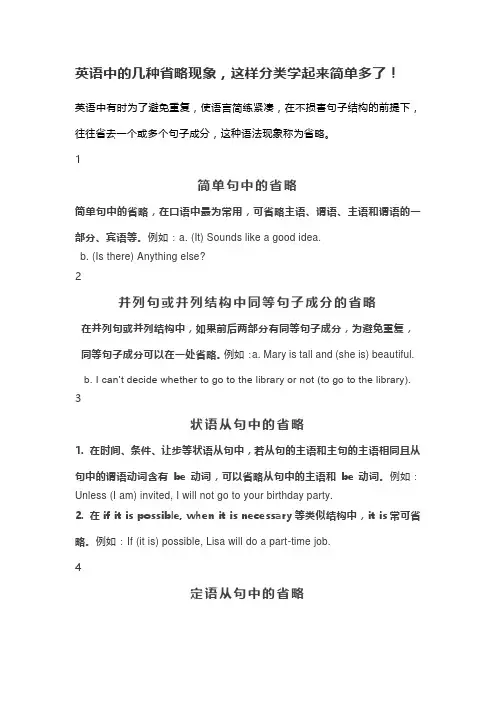
英语中的几种省略现象,这样分类学起来简单多了!英语中有时为了避免重复,使语言简练紧凑,在不损害句子结构的前提下,往往省去一个或多个句子成分,这种语法现象称为省略。
1简单句中的省略简单句中的省略,在口语中最为常用,可省略主语、谓语、主语和谓语的一部分、宾语等。
例如:a. (It) Sounds like a good idea.b. (Is there) Anything else?2并列句或并列结构中同等句子成分的省略在并列句或并列结构中,如果前后两部分有同等句子成分,为避免重复,同等句子成分可以在一处省略。
例如:a. Mary is tall and (she is) beautiful.b. I can’t decide whether to go to the library or not (to go to the library). 3状语从句中的省略1. 在时间、条件、让步等状语从句中,若从句的主语和主句的主语相同且从句中的谓语动词含有be动词,可以省略从句中的主语和be动词。
例如:Unless (I am) invited, I will not go to your birthday party.2. 在if it is possible, when it is necessary等类似结构中,it is常可省略。
例如:If (it is) possible, Lisa will do a part-time job.4定语从句中的省略当关系代词that,which等在限制性定语从句中充当宾语且不位于介词之后时,关系代词可以省略;in which或that在先行词way后时可省略。
例如:a. Is the book (that / which) you’re reading interesting?b. This is the way (in which / that) your parents love you.5不定式符号to的省略1. 在感官动词(see, hear, feel等)和使役动词(have, make, let等)后作宾语补足语时,不定式符号to需省略。
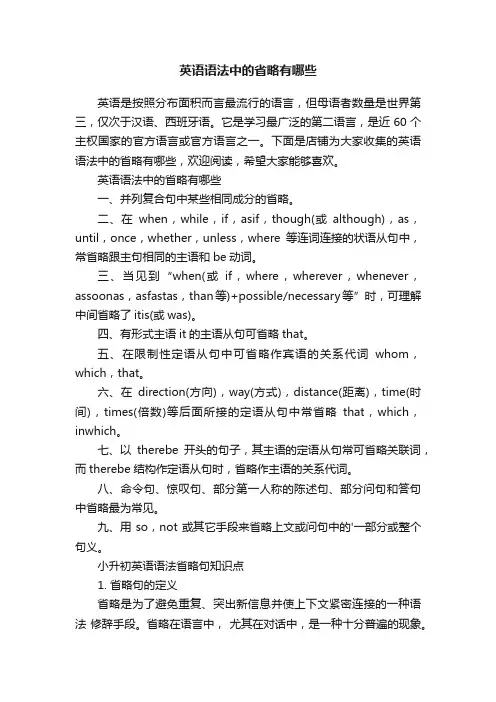
英语语法中的省略有哪些英语是按照分布面积而言最流行的语言,但母语者数量是世界第三,仅次于汉语、西班牙语。
它是学习最广泛的第二语言,是近60个主权国家的官方语言或官方语言之一。
下面是店铺为大家收集的英语语法中的省略有哪些,欢迎阅读,希望大家能够喜欢。
英语语法中的省略有哪些一、并列复合句中某些相同成分的省略。
二、在when,while,if,asif,though(或although),as,until,once,whether,unless,where等连词连接的状语从句中,常省略跟主句相同的主语和be动词。
三、当见到“when(或if,where,wherever,whenever,assoonas,asfastas,than等)+possible/necessary等”时,可理解中间省略了itis(或was)。
四、有形式主语it的主语从句可省略that。
五、在限制性定语从句中可省略作宾语的关系代词whom,which,that。
六、在direction(方向),way(方式),distance(距离),time(时间),times(倍数)等后面所接的定语从句中常省略that,which,inwhich。
七、以therebe开头的句子,其主语的定语从句常可省略关联词,而therebe结构作定语从句时,省略作主语的关系代词。
八、命令句、惊叹句、部分第一人称的陈述句、部分问句和答句中省略最为常见。
九、用so,not或其它手段来省略上文或问句中的'一部分或整个句义。
小升初英语语法省略句知识点1. 省略句的定义省略是为了避免重复、突出新信息并使上下文紧密连接的一种语法修辞手段。
省略在语言中,尤其在对话中,是一种十分普遍的现象。
2.小品词的省略1)省略介词I ‘ ve studied English (for) five years. 我已学五年英语了。
2)省略连词thatI believe (that) you will succeed . 我相信你们会成功的。
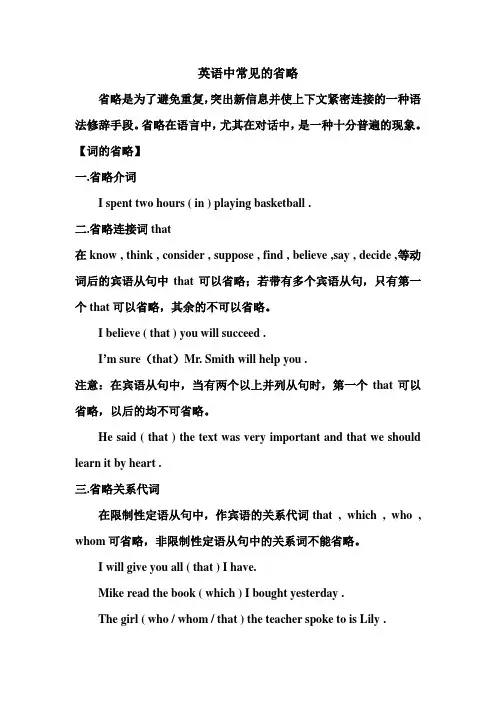
英语中常见的省略省略是为了避免重复,突出新信息并使上下文紧密连接的一种语法修辞手段。
省略在语言中,尤其在对话中,是一种十分普遍的现象。
【词的省略】一.省略介词I spent two hours ( in ) playing basketball .二.省略连接词that在know , think , consider , suppose , find , believe ,say , decide ,等动词后的宾语从句中that可以省略;若带有多个宾语从句,只有第一个that可以省略,其余的不可以省略。
I believe ( that ) you will succeed .I’m sure(that)Mr. Smith will help you .注意:在宾语从句中,当有两个以上并列从句时,第一个that可以省略,以后的均不可省略。
He said ( that ) the text was very important and that we should learn it by heart .三.省略关系代词在限制性定语从句中,作宾语的关系代词that , which , who , whom可省略,非限制性定语从句中的关系词不能省略。
I will give you all ( that ) I have.Mike read the book ( which ) I bought yesterday .The girl ( who / whom / that ) the teacher spoke to is Lily .【句子成分的省略】一.省略主语。
如:Beg your pardon. ( Beg前省略了主语I )Take care ! ( Take前省略了主语you )Looks as if it is going to rain . ( Looks前省略了主语it )二.省略谓语。
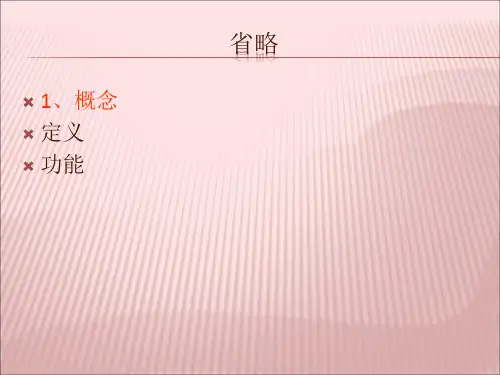
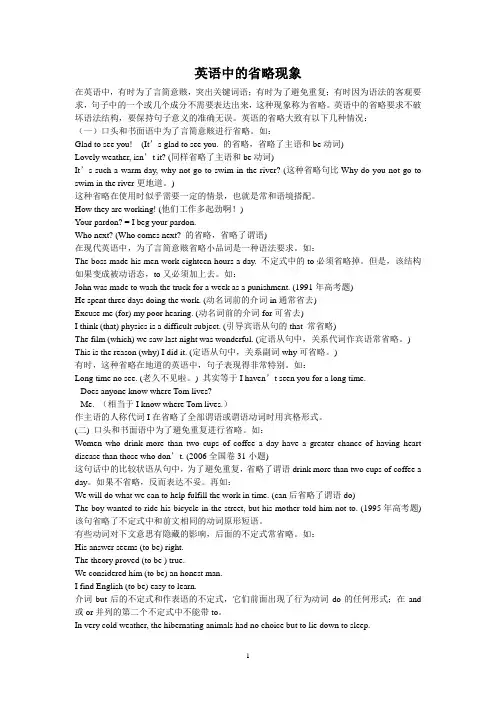
英语中的省略现象在英语中,有时为了言简意赅,突出关键词语;有时为了避免重复;有时因为语法的客观要求,句子中的一个或几个成分不需要表达出来,这种现象称为省略。
英语中的省略要求不破坏语法结构,要保持句子意义的准确无误。
英语的省略大致有以下几种情况:(一)口头和书面语中为了言简意赅进行省略。
如:Glad to see you! (It’s glad to see you. 的省略,省略了主语和be动词)Lovely weather, isn’t it? (同样省略了主语和be动词)It’s such a warm day, why not go to swim in the river? (这种省略句比Why do you not go to swim in the river更地道。
)这种省略在使用时似乎需要一定的情景,也就是常和语境搭配。
How they are working! (他们工作多起劲啊!)Your pardon? = I beg your pardon.Who next? (Who comes next? 的省略,省略了谓语)在现代英语中,为了言简意赅省略小品词是一种语法要求。
如:The boss made his men work eighteen hours a day. 不定式中的to必须省略掉。
但是,该结构如果变成被动语态,to又必须加上去。
如:John was made to wash the truck for a week as a punishment. (1991年高考题)He spent three days doing the work. (动名词前的介词in通常省去)Excuse me (for) my poor hearing. (动名词前的介词for可省去)I think (that) physics is a difficult subject. (引导宾语从句的that 常省略)The film (which) we saw last night was wonderful. (定语从句中,关系代词作宾语常省略。
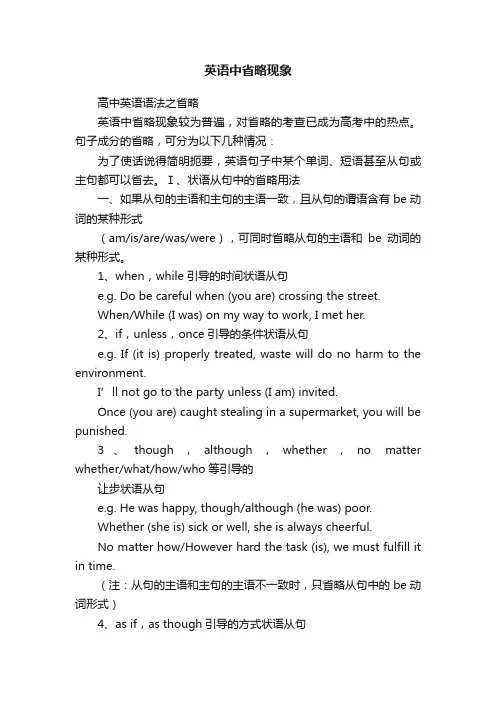
英语中省略现象高中英语语法之省略英语中省略现象较为普遍,对省略的考查已成为高考中的热点。
句子成分的省略,可分为以下几种情况:为了使话说得简明扼要,英语句子中某个单词、短语甚至从句或主句都可以省去。
Ⅰ、状语从句中的省略用法一、如果从句的主语和主句的主语一致,且从句的谓语含有be动词的某种形式(am/is/are/was/were),可同时省略从句的主语和be动词的某种形式。
1、when,while引导的时间状语从句e.g. Do be careful when (you are) crossing the street.When/While (I was) on my way to work, I met her.2、if,unless,once引导的条件状语从句e.g. If (it is) properly treated, waste will do no harm to the environment.I’ll not go to the party unless (I am) invited.Once (you are) caught stealing in a supermarket, you will be punished.3、though,although,whether,no matter whether/what/how/who等引导的让步状语从句e.g. He was happy, though/although (he was) poor.Whether (she is) sick or well, she is always cheerful.No matter how/However hard the task (is), we must fulfill it in time.(注:从句的主语和主句的主语不一致时,只省略从句中的be动词形式)4、as if,as though引导的方式状语从句e.g. He rubbed his eyes and yawned as if/though (he was) waking up after along sleep.He stood up as if/though (he wanted) to leave.(as if/though + to do表示一个将来的动作)二、than,as引导的比较状语从句中的省略用法:当不同的主语进行比较时,一般省略从句中的谓语;当从句中的主语与谓语(be动词除外)和主句中的主语与谓语相同时,通常省略从句中的主语和谓语,只保留比较部分。
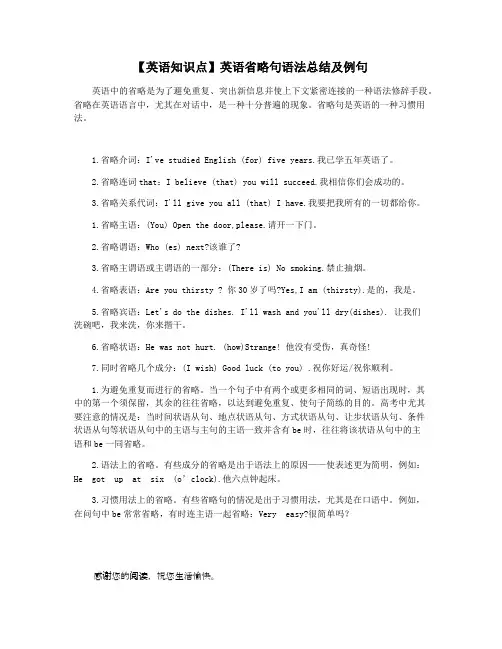
【英语知识点】英语省略句语法总结及例句英语中的省略是为了避免重复、突出新信息并使上下文紧密连接的一种语法修辞手段。
省略在英语语言中,尤其在对话中,是一种十分普遍的现象。
省略句是英语的一种习惯用法。
1.省略介词:I've studied English (for) five years.我已学五年英语了。
2.省略连词that:I believe (that) you will succeed.我相信你们会成功的。
3.省略关系代词:I'll give you all (that) I have.我要把我所有的一切都给你。
1.省略主语:(You) Open the door,please.请开一下门。
2.省略谓语:Who (es) next?该谁了?3.省略主谓语或主谓语的一部分:(There is) No smoking.禁止抽烟。
4.省略表语:Are you thirsty ? 你30岁了吗?Yes,I am (thirsty).是的,我是。
5.省略宾语:Let's do the dishes. I'll wash and you'll dry(dishes). 让我们洗碗吧,我来洗,你来揩干。
6.省略状语:He was not hurt. (how)Strange! 他没有受伤,真奇怪!7.同时省略几个成分:(I wish) Good luck (to you) .祝你好运/祝你顺利。
1.为避免重复而进行的省略。
当一个句子中有两个或更多相同的词、短语出现时,其中的第一个须保留,其余的往往省略,以达到避免重复、使句子简练的目的。
高考中尤其要注意的情况是:当时间状语从句、地点状语从句、方式状语从句、让步状语从句、条件状语从句等状语从句中的主语与主句的主语一致并含有be时,往往将该状语从句中的主语和be一同省略。
2.语法上的省略。
有些成分的省略是出于语法上的原因——使表述更为简明,例如:He got up at six (o’clock).他六点钟起床。
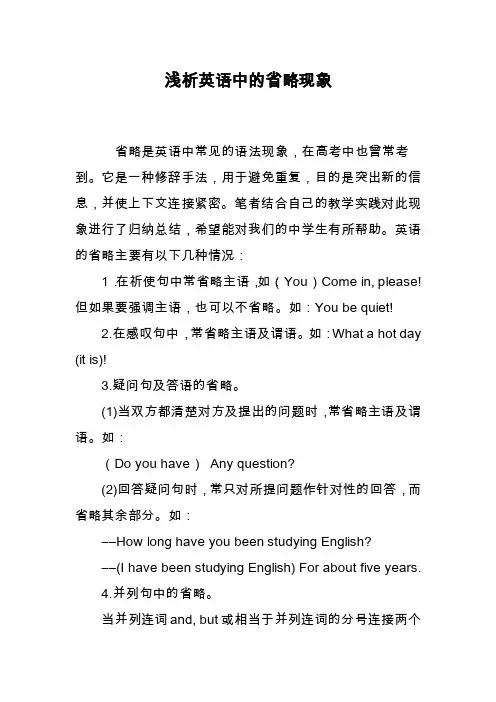
浅析英语中的省略现象省略是英语中常见的语法现象,在高考中也曾常考到。
它是一种修辞手法,用于避免重复,目的是突出新的信息,并使上下文连接紧密。
笔者结合自己的教学实践对此现象进行了归纳总结,希望能对我们的中学生有所帮助。
英语的省略主要有以下几种情况:1.在祈使句中常省略主语,如:(You)Come in, please!但如果要强调主语,也可以不省略。
如:You be quiet!2.在感叹句中,常省略主语及谓语。
如:What a hot day (it is)!3.疑问句及答语的省略。
(1)当双方都清楚对方及提出的问题时,常省略主语及谓语。
如:(Do you have)Any question?(2)回答疑问句时,常只对所提问题作针对性的回答,而省略其余部分。
如:――How long have you been studying English?――(I have been studying English) For about five years.4.并列句中的省略。
当并列连词and, but或相当于并列连词的分号连接两个分句时,第二个分句常省略和第一个分句相同的成分。
如:①It is one thing to talk, but (it is) another thing to do.说是一回事,但做是另一回事。
②She has gone to the library, and they have (gone to the library) too.5.陈述句中的省略。
(1)在“主语+be+表语”结构中,当主语是表示人的心理状态或对人评价夸奖的词时,常省略主语及系动词be。
如:①(You are) Great!②(I am) Glad to see you again!(2)在向对方提出希望或表达祝愿时,常省略主语。
如:Wish you a pleasant journey!6.年龄和钟点的省略。
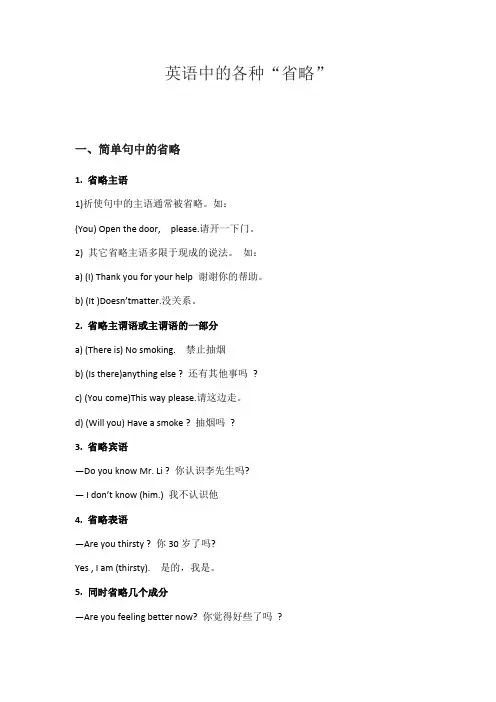
英语中的各种“省略”一、简单句中的省略1. 省略主语1)祈使句中的主语通常被省略。
如:(You) Open the door,please.请开一下门。
2) 其它省略主语多限于现成的说法。
如:a) (I) Thank you for your help 谢谢你的帮助。
b) (It )Doesn’tmatter.没关系。
2. 省略主谓语或主谓语的一部分a) (There is) No smoking.禁止抽烟b) (Is there)anything else ? 还有其他事吗?c) (You come)This way please.请这边走。
d) (Will you) Have a smoke ? 抽烟吗?3. 省略宾语—Do you know Mr. Li ? 你认识李先生吗?—I don’t know (him.) 我不认识他4. 省略表语—Are you thirsty ? 你30岁了吗?Yes , I am (thirsty).是的,我是。
5. 同时省略几个成分—Are you feeling better now? 你觉得好些了吗?—(I am feeling ) Much better(now) 好多了。
(I wish) Good luck (to you) .祝你好运/祝你顺利。
二. 并列复合句中的省略在并列句中后边的分句可以省略与前边分句中相同的成分。
如:a) The boy picked up a coin in the road and (the boy ) handed it to a policeman.这个男孩在马路上拾起一枚硬币并把他交给了警察。
b) Your advice made me happy but(your advice made) Tom angry .你的建议使我高兴但使汤姆生气。
c) Tom must have been playing basketball and Mary (must have been)doing her homework.汤姆肯定一直在打篮球,玛丽一直在写作业。
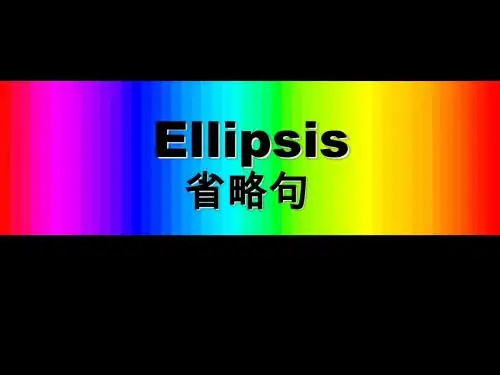
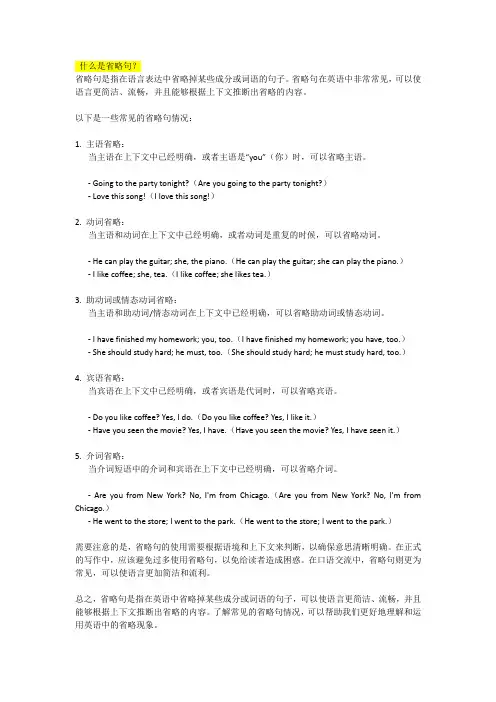
什么是省略句?省略句是指在语言表达中省略掉某些成分或词语的句子。
省略句在英语中非常常见,可以使语言更简洁、流畅,并且能够根据上下文推断出省略的内容。
以下是一些常见的省略句情况:1. 主语省略:当主语在上下文中已经明确,或者主语是“you”(你)时,可以省略主语。
- Going to the party tonight?(Are you going to the party tonight?)- Love this song!(I love this song!)2. 动词省略:当主语和动词在上下文中已经明确,或者动词是重复的时候,可以省略动词。
- He can play the guitar; she, the piano.(He can play the guitar; she can play the piano.)- I like coffee; she, tea.(I like coffee; she likes tea.)3. 助动词或情态动词省略:当主语和助动词/情态动词在上下文中已经明确,可以省略助动词或情态动词。
- I have finished my homework; you, too.(I have finished my homework; you have, too.)- She should study hard; he must, too.(She should study hard; he must study hard, too.)4. 宾语省略:当宾语在上下文中已经明确,或者宾语是代词时,可以省略宾语。
- Do you like coffee? Yes, I do.(Do you like coffee? Yes, I like it.)- Have you seen the movie? Yes, I have.(Have you seen the movie? Yes, I have seen it.)5. 介词省略:当介词短语中的介词和宾语在上下文中已经明确,可以省略介词。
省略结构
1.省略的前提条件是必须保持句子意思的完成无缺,不能引起争议和歧义
2.省略往往是为了避免重复,可以承接前面的内容省略(承前省略),有的可以承接后文的内容省略(后指省略)。
He is not only a teacher of English, but also of Chinese. (of 前省略了a teacher)
3.省略的部分要能够“还原”,还原后语法上要求结构对应,逻辑关系正确。
4.定语从句的省略
5.状语从句的省略
标准书面语中,状语从句的省略:表示转折、时间、条件的连词+ 形容词短语/分词短语
错误形式:连词+ 介词短语/名词短语
特例:once 可以加介词短语/名词短语,whatever 可以加名词短语构成状语从句省略。
IF+
6.比较结构中的省略
7.并列结构中的省略
1)省略相同的主语,宾语,连系动词,助动词和情态动词
2)两个句子并列,第一个句子含有be 动词或者become, 第二个句子中的be 动词或become 必须省略,同时,一些重复的名词或形容词也必须省略。
8.习惯性省略
As needed; as planned; as required; as scheduled
Whenever necessary/needed/possible; wherever necessary/needed/possible than ever; than before; than ever before; than usual; than expected;。
省略句的常见形式与虚拟语气与宾语从句的关系在英语语法中,省略句是一种常见的句子构造形式,它可以简化表达,减少重复,并增加语言的流畅性。
虚拟语气和宾语从句则是两个与省略句密切相关的语法现象,在句子中起着重要的作用。
本文将重点探讨省略句的常见形式、虚拟语气以及宾语从句与省略句之间的关系。
一、省略句的常见形式1. 主语省略主语省略指的是在句子中省略了主语,常出现在陈述句中,日常生活中的对话中尤为常见。
例如:- Are you coming? (你来吗?)- Hope so. (希望如此。
)2. 动词省略动词省略是指省略句中的谓语动词,常出现在情态动词、感官动词、系动词等后面。
例如:- Can you swim?- I can. (我会。
)3. 动词短语省略动词短语省略是指省略句中的动词短语,常出现在对话中,用于回答之前提到的动作或情况。
例如:- Did you buy the book?- Bought it yesterday. (昨天买了。
)二、虚拟语气与省略句虚拟语气是英语中一种重要的语法现象,用于表示与事实相反的假设、愿望、建议、命令等情况。
虚拟语气与省略句之间常有紧密的联系,特别是在条件从句和宾语从句中。
1. 条件从句在条件从句中,省略句常常用来简化重复的表达,而虚拟语气则用于表示与事实相反的假设。
例如:- If I were you, I would go. (如果我是你,我会去。
)- If I had time, I would help. (如果我有时间,我会帮忙。
)2. 宾语从句宾语从句是一个句子作为宾语出现在主句中,而省略句的使用可以让句子更简洁明了。
虚拟语气在宾语从句中的使用也是常见的。
例如:- I suggest (that) he come early. (我建议他早点来。
)- She insisted that he be present at the meeting. (她坚持他参加会议。
英语中常见的省略英语中常见的省略省略是为了避免重复,突出新信息并使上下⽂紧密连接的⼀种语法修辞⼿段。
省略在语⾔中,尤其在对话中,是⼀种⼗分普遍的现象。
【词的省略】⼀.省略介词I spent two hours ( in ) playing basketball .⼆.省略连接词that在know , think , consider , suppose , find , believe ,say , decide ,等动词后的宾语从句中that可以省略;若带有多个宾语从句,只有第⼀个that可以省略,其余的不可以省略。
I believe ( that ) you will succeed .I’m sure(that)Mr. Smith will help you .注意:在宾语从句中,当有两个以上并列从句时,第⼀个that可以省略,以后的均不可省略。
He said ( that ) the text was very important and that we should learn it by heart .三.省略关系代词在限制性定语从句中,作宾语的关系代词that , which , who , whom可省略,⾮限制性定语从句中的关系词不能省略。
I will give you all ( that ) I have.Mike read the book ( which ) I bought yesterday .The girl ( who / whom / that ) the teacher spoke to is Lily .【句⼦成分的省略】⼀.省略主语。
如:Beg your pardon. ( Beg前省略了主语I )Take care ! ( Take前省略了主语you )Looks as if it is going to rain . ( Looks前省略了主语it )⼆.省略谓语。
考研英语表达中有一个不成文的原则,叫做避免重复原则。
比方说在并列句中,并列连词左右两边的部分,在内容上有重复的,一般后面的部分要省略掉重复的内容,但是两边部分的内容结构一定是对称的和平衡的。
以下三种情况是为大家总结的并列句中常见的省略现象:1、如果并列句中的左右两个分句虽然主语不同,但是两个分句有相同的be动词,那么可以省略连词和后一个分句的be动词。
例句:Its scientists were the world’s best, (省略and) its workers (省略were) themost skilled.译文:它的科学家是世界上最好的,它的工人是世界上最熟练的。
例句:Failing hips can be replaced, (省略and) clinical depression (省略can be)controlled, (省略and) cataracts (省略can be) removed in a30-minute surgical procedure.译文:髋骨坏了可以换,临床忧郁症可以得到控制,白内障仅用30分钟的手术就能治好。
例句:It is said that in England death is pressing, (省略and) in Canada (省略death is) inevitable and in California (省略death is) optional.译文:据说,在英国死亡是迫在眉睫的,在加拿大死亡是不可避免的,而在加利福尼亚死亡则是可以选择的。
2、如果并列句中左右两个分句出现重复的部分,那么后一个分句可以省略重复的部分,但是没有重复的部分要保留。
例句:Do you remember all those years when scientists argued that smokingwould kill us but the doubters insisted that we did not know (省略that smokingwould kill us) for sure译文:你还记得那些年科学家说吸烟会致命,但怀疑者坚持说我们并不确定吸烟是否真的会致命吗3、在并列句中后边的分句可以省略与前边分句中相同的成分。
英语中的省略现象在英语中,有时为了言简意赅,突出关键词语;有时为了避免重复;有时因为语法的客观要求,句子中的一个或几个成分不需要表达出来,这种现象称为省略。
英语中的省略要求不破坏语法结构,要保持句子意义的准确无误。
英语的省略大致有以下几种情况:(一)口头和书面语中为了言简意赅进行省略。
如:Glad to see you! (It’s glad to see you. 的省略,省略了主语和be动词)Lovely weather, isn’t it? (同样省略了主语和be动词)It’s such a warm day, why not go to swim in the river? (这种省略句比Why do you not go to swim in the river更地道。
)这种省略在使用时似乎需要一定的情景,也就是常和语境搭配。
How they are working! (他们工作多起劲啊!)Your pardon? = I beg your pardon.Who next? (Who comes next? 的省略,省略了谓语)在现代英语中,为了言简意赅省略小品词是一种语法要求。
如:The boss made his men work eighteen hours a day. 不定式中的to必须省略掉。
但是,该结构如果变成被动语态,to又必须加上去。
如:John was made to wash the truck for a week as a punishment. (1991年高考题)He spent three days doing the work. (动名词前的介词in通常省去)Excuse me (for) my poor hearing. (动名词前的介词for可省去)I think (that) physics is a difficult subject. (引导宾语从句的that 常省略)The film (which) we saw last night was wonderful. (定语从句中,关系代词作宾语常省略。
外教一对一
英语语法中的省略现象
并列复合句中的省略
在并列句中后边的分句可以省略与前边分句中相同的成分。
如:
a) The boy picked up a coin in the road and (the boy ) handed it to a policeman. 这个男孩在马路上拾起一枚硬币并把他交给了警察。
b) Your advice made me happy but(your advice made) Tom angry .你的建议使我高兴但使汤姆生气。
c) Tom must have been playing basketball and Mary (must have been)doing her homework. 汤姆肯定一直在打篮球,玛丽一直在写作业。
d) Gao Xiumin was born in 1959 and Fu Biao (was born) in 1963.高秀敏出生于 1959 年,傅彪出生于 1963 年。
其他一些省略结构
1.名词所有格修饰的名词,若表示住宅、店铺、教堂或上下文已暗示或明确指出过的事物时,常常可以省略。
如:
We spent the weekend at the Mary's. 我们在玛丽家过的周末。
2.What 和 how 引导的感叹句中,常可省略主语 it 和 be 动词如:
a) What a wonderful victory (it is ) for Tom ! 这对 Tom 来说是个多么大的胜利呀!
b) How beautiful (it is ) to be treated like a normal child. 被当作一个正常孩子对待对他而言是多么美妙的一件事呀。
外教一对一。